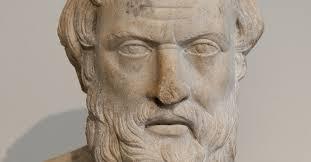Four amazing astronomical discoveries from ancient Greece
Curated from: theconversation.com
Ideas, facts & insights covering these topics:
5 ideas
·698 reads
4
2
Explore the World's Best Ideas
Join today and uncover 100+ curated journeys from 50+ topics. Unlock access to our mobile app with extensive features.
Strange discovery from early history
In the Histories by Herodotus (484BC to 425BC), Herodotus recounts the story of Phoenician sailors who were dispatched by King Neco II ofEgypt (about 600BC), to sail clockwise around continental Africa, starting in the Red Sea.
The voyage took years. As they rounded the southern tip of Africa, and following a westerly course, the sailors observed the Sun as being on their right-hand side, above the northern horizon. Because they still thought the Earth was flat, the observation did not make sense at the time.
56
207 reads
The planets orbit the Sun
The earliest known heliocentric theory of the solar system came from Aristarchus of Samos (310BC to 230BC). He argued that the Sun was central. He also placed all the then known planets is their correct order of distance around the Sun. His original text was unfortunately lost to history.
Nicolaus Copernicus rediscovered the theory in the 16th century. He acknowledged Aristarchus during the development of his own work.
51
173 reads
The size of the Moon
In one of Aristarchus' books that did survive, he laid out the earliest known attempted calculations of the sizes and distances to the Sun and Moon.
From solar eclipses, where the Moon passes in front of the Sun, they realised that the Sun was further away. Aristarchus estimated that the size of the Moon was approximately one-third that of the Earth, based on the careful timing of lunar eclipses. He was surprisingly accurate in determining the ratio of the size of the Earth to the Moon. (the Moon has a diameter 0.27 times that of Earth).
51
123 reads
The Earth’s circumference
- Eratosthenes (276BC to 195BC) relied on measuring the different lengths of shadows cast by poles stuck vertically into the ground, at midday on the summer solstice, at different latitudes. The difference in the shadows demonstrated how much the Earth's surface curved. Eratosthenes estimated the Earth's circumference as approximately 40,000km.
- Another scientist called Posidonius (135BC to 51BC) who lived on the island of Rhodes, arrived at almost exactly the same answer. He observed the bright star Canopus would lie very close to the horizon, but when in Alexandria, in Egypt, Canopus would ascend to some 7.5 degrees above the horizon. 7.5 degrees is 1/48th of a circle, and multiplying the distance from Rhodes to Alexandria by 48, arrived at approximately 40,000km.
49
92 reads
The first astronomical calculator
The Antikythera Mechanism is the word's oldest surviving mechanical calculator. The device was discovered in an ancient shipwreck in 1900 and dates between the 3rd and 1st centuries BC.
When manually rotated by a handle, the gears span dials on the exterior showing the Moon's phases, the timing of lunar eclipses, and the positions of the five planets then known (Mercury, Venus, Mars, Jupiter, and Saturn) at different times of the year.
47
103 reads
IDEAS CURATED BY
Zara Michaels's ideas are part of this journey:
Learn more about personaldevelopment with this collection
How to create a productive environment
The importance of self-care in productivity
How to avoid distractions
Related collections
Similar ideas
2 ideas
Eratosthenes - Wikipedia
en.wikipedia.org
10 ideas
Read & Learn
20x Faster
without
deepstash
with
deepstash
with
deepstash
Personalized microlearning
—
100+ Learning Journeys
—
Access to 200,000+ ideas
—
Access to the mobile app
—
Unlimited idea saving
—
—
Unlimited history
—
—
Unlimited listening to ideas
—
—
Downloading & offline access
—
—
Supercharge your mind with one idea per day
Enter your email and spend 1 minute every day to learn something new.
I agree to receive email updates

